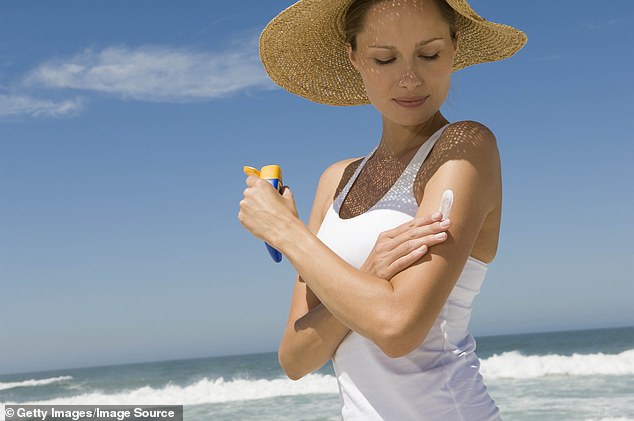Heading to warmer climes for a late break or soaking up the last rays of the UK? Be aware that your regular beauty creams and supplements may interact negatively with sunlight.
“People don’t realize that what you put on your face and body can make your skin more sensitive to the sun,” says aesthetic specialist Dr John Quinn of Quinn Clinics.
From spot creams that could be aging to supplements that mean you need to wear sunglasses and fragrances that could lead to breakouts, our experts reveal the six ways your well-being could be affecting you…

Some creams can make your skin more sensitive to the sun
CITRUS SMELL DANGER
You might think dabbling in a little essential oil is the perfect way to smell like summer—but natural isn’t always safe. Certain essential oils are phototoxic, meaning that if applied to skin that is then exposed to UV rays, they can cause sensitivity leading to redness, rashes, and itching.

Dr. Mervyn Patterson
Citrus oils, in particular, contain furanocoumarins, which are compounds present in many cosmetics.
Although furanocoumarins are useful in the treatment of certain skin conditions, they can cause skin rashes and even blisters.
Their quantities are limited in certain countries; In 2003, the European Commission stated that it could not be more than 1 mg/kg in tanning cream.
“Anything with a citrus smell is likely to contain them,” says aesthetic specialist Dr Mervyn Patterson of Woodford Medical.
“Cover any area where you have applied them or use only at night. And always use SPF.’
EYE UP ST JOHN’S WORT
This popular supplement is a natural antidepressant used to treat anxiety, low mood, and PMS. But be careful. “Hypericin and other compounds can increase the skin’s reaction to UV light and make it more sensitive,” says Dr Nabila Jones, optometrist at Optegra.

Dr. Nabila Jones
It can also affect exposed eyes. “Another mentioned side effect is light sensitivity in the eyes, which can cause discomfort in bright light.
In severe cases, this condition called photophobia can potentially contribute to cataracts or macular degeneration.
If you are taking St. John’s wort, avoid direct sunlight, wear protective eyewear such as sunglasses, and see a healthcare professional if you experience eye discomfort.
LET THE LEASERS
While it’s tempting to make pre-holiday makeovers like laser treatments to improve the appearance of your skin, experts recommend leaving it until winter to ensure a high level of aesthetics remains.
“We also advise against laser hair removal anywhere in sunlight,” says Dr Quinn. “It leaves the skin vulnerable, which can lead to redness, burning and increased pigmentation.”
BE CAREFUL WITH THE SUNSHINE VITAMINS
Given that we need sunshine to make it, there have been some surprising cases of dangerously high vitamin D levels in the UK. This vitamin has important benefits for bones and the immune system, but many of us are deficient (and it’s recommended that we all take a supplement in the winter). We also get some from our diet, but many of us also take supplements. The upper safe level is 100mcg/4000IU for adults.

Dr. Oliver Guttman
“Vitamin D is fat-soluble and is therefore stored in the body, even if only for a few months, meaning it can potentially build up to dangerous levels,” says leading nutritionist Emma Bardwell.
“Too much vitamin D can lead to calcium build-up (hypocalcemia), which can damage bones, kidneys and the heart. Complications are rare, but read labels to understand dosages, especially if you take a multivitamin on top of specific vitamin D.’
“Hypocalcemia can affect blood vessels and cause the heart to beat too fast or too slow,” says Dr Oliver Guttman, consultant cardiologist at Wellington Hospital.
The NHS website says you can’t overdose on vitamin D from sunlight and whether you take a supplement on holiday depends on your individual levels.
“Some people need a year-round supplement as vitamin D synthesis in the skin is not always straightforward, plus we can become less efficient at making vitamin D as we age, but everyone’s requirements are unique.” Your best bet is to get your scores tested so you know if you’re up to it or not,” says Bardwell.
FOR VITAMIN A
All retinoids – or vitamin A – increase cell turnover and are widely used in night creams, but ironically, this also makes the skin more prone to pigmentation and sunburn.
“The new ruling means that the amount of retinol in over-the-counter products is being reduced,” says Dr Patterson. “You still need to make sure you use a high SPF if you do use them and avoid direct sunlight on your face.”
SUSS OUT YOUR FLAT TREATMENT
Benzoyl peroxide, found in many blemish and acne treatments, works by killing bacteria on the skin – and must not be mixed with UV rays. “It’s very effective, but it also creates free radicals and can create redness and premature aging – it’s like going into the sun unprotected,” says Dr Patterson.
Teenagers mostly use these products and are frustratingly resistant to the idea of covering up, but Dr Patterson insists that if you’re using a product containing benzoyl peroxide to deal with your acne: “You have to use a high SPF and avoid direct sunlight as much as possible.’
#surprising #ways #beauty #system #reacts #sun #supplement #damage #eyes #cream #wrinkles